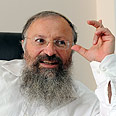
Rabbi calls for sacrifice on Temple Mount
Jews evading Passover mitzvah are risking supernatural punishment, warns Safed's Chief Rabbi Shmuel Eliyahu
The annual attempts to resume the Passover sacrifice received a first significant rabbinical backing recently. Safed's Chief Rabbi Shmuel Eliyahu, a prominent religious Zionism leader, has called on the public to perform the sacrifice mitzvah on the eve of the Jewish holiday, in about two weeks.
Speaking during a Halacha lesson in Jerusalem last week, the rabbi warned that Jews evading the mitzvah were risking "Kareth" - a supernatural punishment for transgressing Jewish Law.
According to Rabbi Eliyahu, there is a halachic, legal and public possibility to offer a Passover sacrifice these days. During the lesson, he quoted senior rabbinical authorities, adding that Rabbi Zvi Hirsch Kalisher – one of the founders of modern and religious Zionism – had asked the Turkish sultan to allot an area on the Temple Mount for the erection of an altar for a Passover sacrifice.
The Safed rabbi went on to say that the Passover sacrifice could be slaughtered in front of the Dome of the Rock plaza, although the Temple no longer exists and the people of Israel are defined as "tameh met" (in a status of impurity which comes from contact with a dead body).
In order to overcome the greatest obstacle, beyond the political problem, an altar must be erected, the rabbi said. He also called for the preparation of "priesthood clothes", which are the only ones in which Kohanim (priests) can perform their work at the Temple.
Mission possible
Addressing the legal aspect, Rabbi Eliyahu claimed that every person has the right to perform the commandment of his religion according to his own understanding. He added that petitions filed with the High Court of Justice against the sacrifice were accepted only because the police were unprepared to secure the ceremony.
"It's perfectly clear that if the public pressures its representatives in the government or in the Knesset, everything will change. If the judges have ruled that the police must secure simpler protests, why not the Passover sacrifice?"
Eliyahu rejected the claim that it was impossible to resume the mitzvah publicly. Addressing the international diplomatic ramifications, he said, "We are being threatened that any movement on our part on the Temple Mount will launch the third world war… (But) we can free our souls of the horror of the gentiles, just like we freed ourselves before the Exodus."
He rejected the internal opposition too. "Some fear the public echo of the Passover sacrifice – how will the seculars view it? What will the Society for the Prevention of Cruelty to Animals say? The truth is that this should not even be discussed…
"We have already been scorned for the circumcision mitzvah, persecuted and condemned to death for that. Today the UN's health organization recommends that all men undergo circumcision in order to avoid illnesses."
Rabbi Eliyahu said the Torah had predicted that some would mock the sacrifice mitzvah. Such a person, he noted, is called in the Passover Haggadah, the "wicked son", who cleans his hands and says, "This doesn’t belong to me, this blood and primitiveness. I am an enlightened person. I respect animals. I don't slaughter them barbarically."
The rabbi estimated, based on the Bible stories, that those who oppose this mitzvah would eventually change their mind and join the Temple work.
'Break spiritual barrier'
In order to increase the motivation to offer a Passover sacrifice, Eliyahu noted that this is one of two "active mitzvot" (along with the circumcision), and that those evading it risk supernatural punishment and "cause great damage to themselves and to the entire world".
He added that his father, former Chief Rabbi Mordechai Eliyahu, wrote that this custom may still exist these days.
"These things should make us break the spiritual barrier preventing us from thinking about offering the Passover sacrifice," Rabbi Eliyahu concluded.
He said his remarks were not lip service, but laws being learned "as a real demand and real preparation for the Passover sacrifice. Although we are not used to it, and have gotten used to living without a temple, we must change our ways."
- Follow Ynetnews on Facebook










